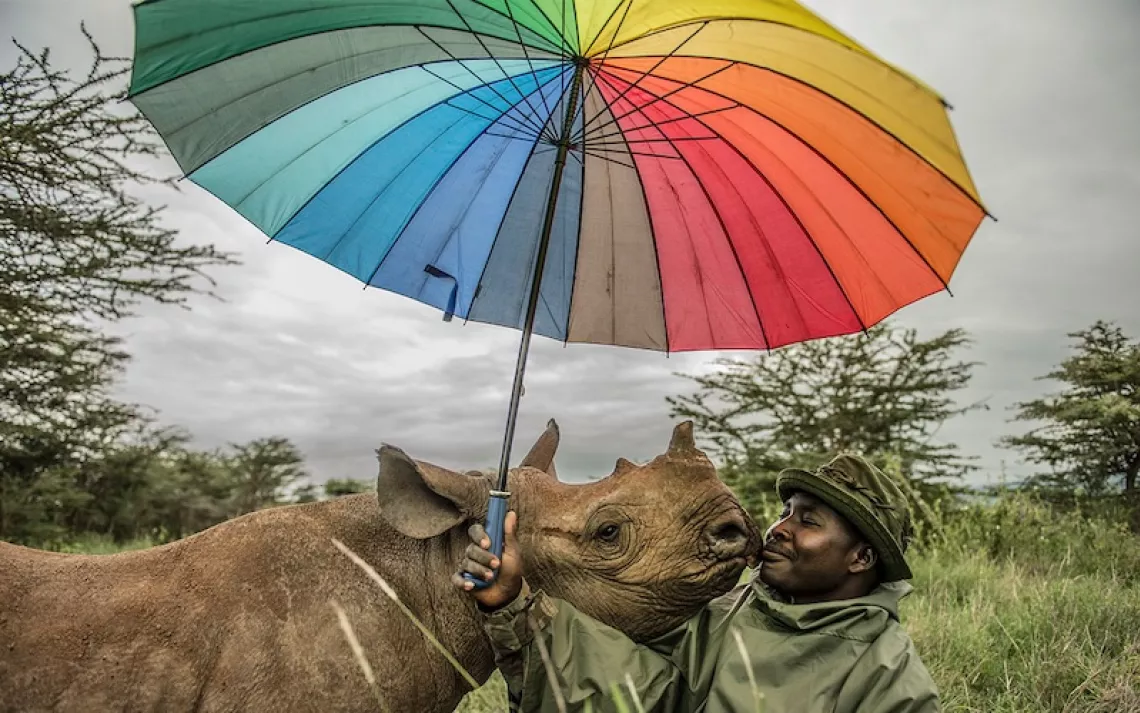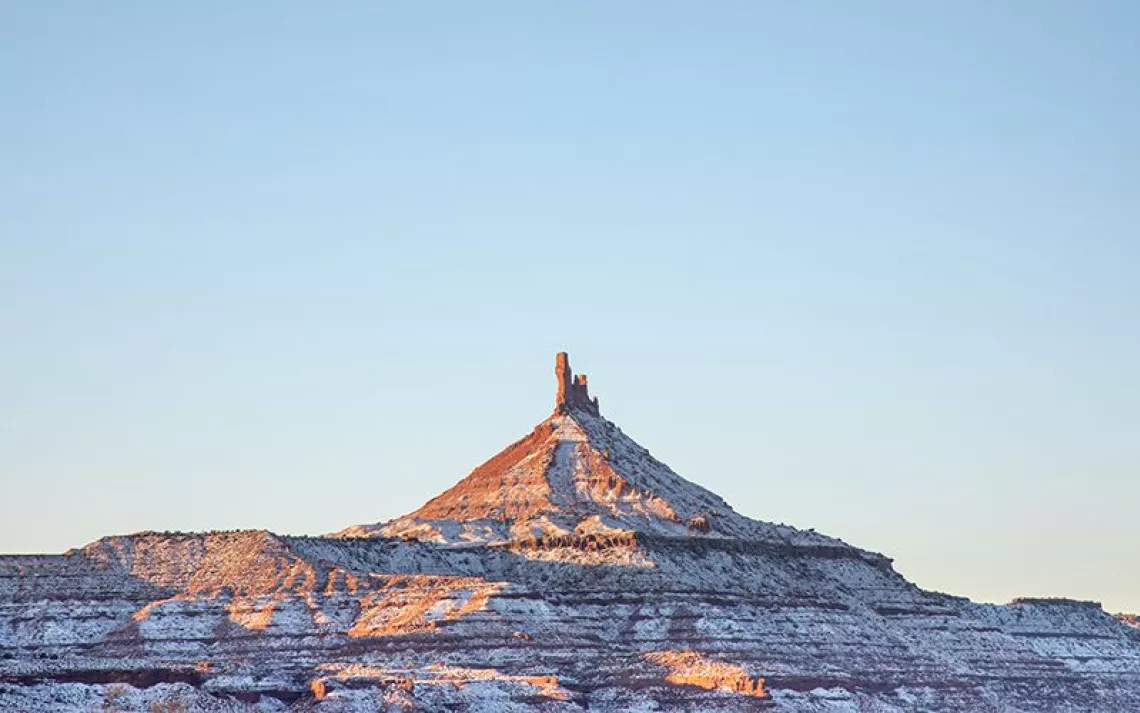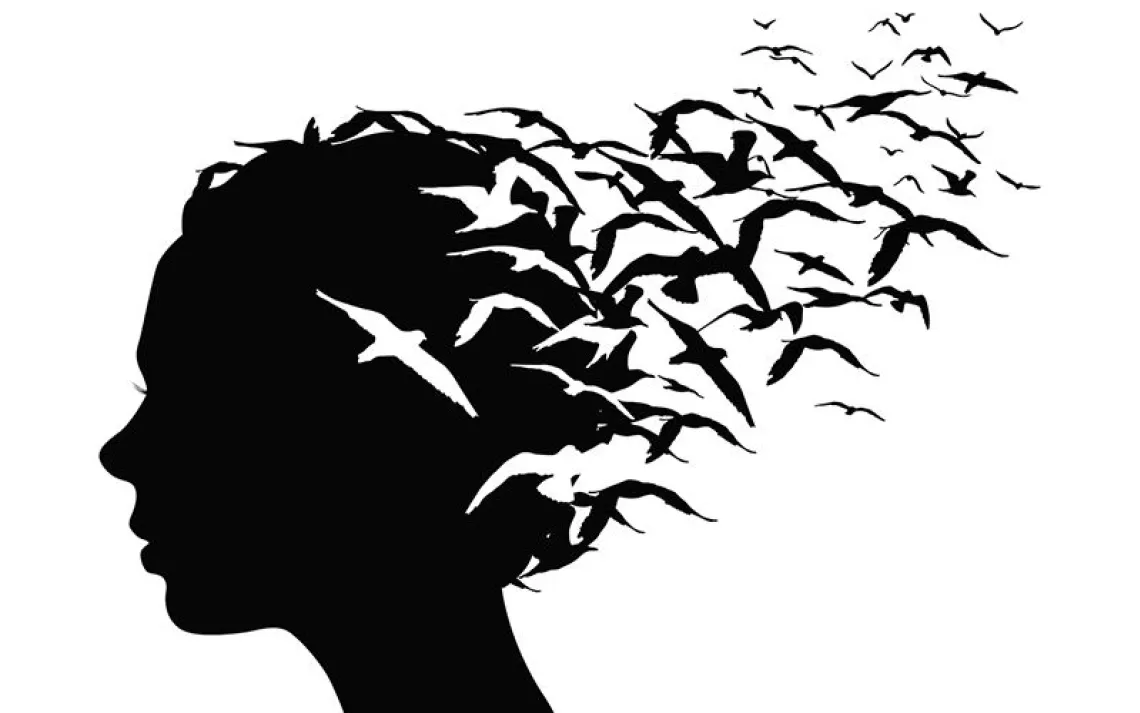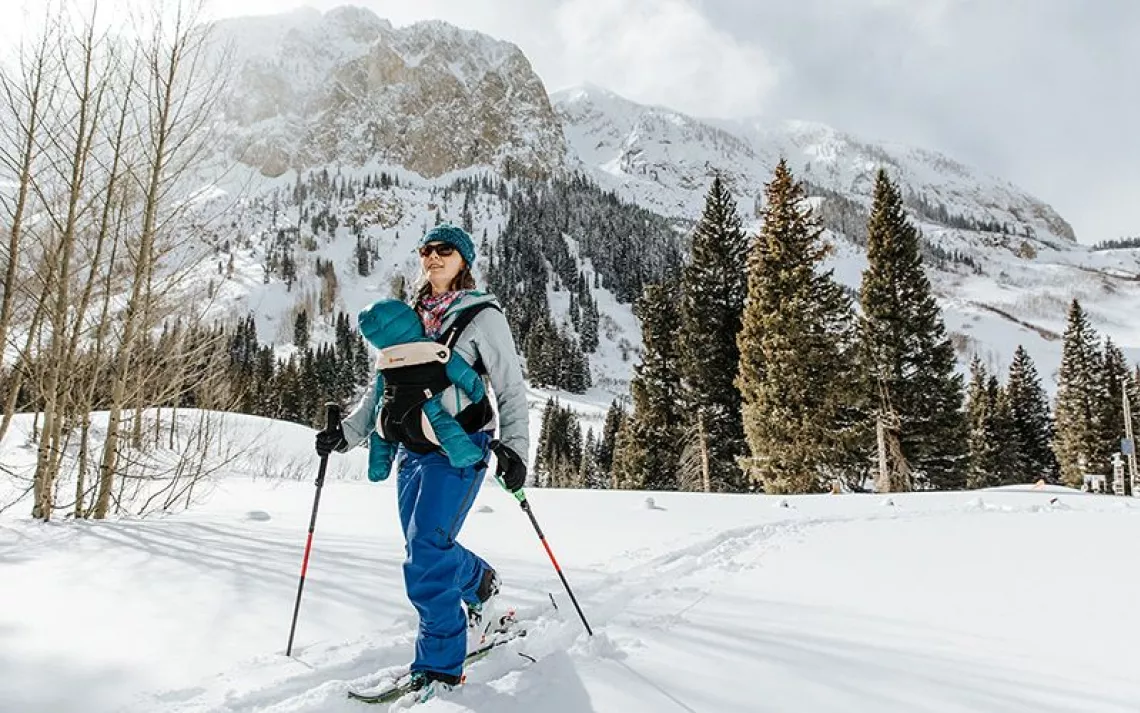To Have or Not to Have Children in the Age of Climate Change
Dispatches from one millennial's uterus

Illustration by Ellice Weaver
"You can't be honest with yourself about what you want and think about the climate crisis at the same time—you might as well plant your feet in cement," therapist Ann Davidman tells me in her airy Oakland office. A sixty-something who bills herself as a baby-decision "clarity counselor," Davidman has made a career out of using writing prompts and guided visualizations to help people like me figure out whether they want to have kids. I'm on her couch this sunny summer afternoon because, like increasing numbers of millennials and Generation Zers, I'm worried that if I procreate, I will contribute to melting ice caps, rising seas, and extreme weather. Worse, I might create brand-new victims of climate change—people who never asked to be part of this human-made mess. I've never been a hard yes or no on the baby question, and now that I'm 34, this indecision, not unlike my egg reserve, is getting old.
Complicating factors abound: I recently found myself single after ending a nearly decade-long relationship. For me, being back in the dating pool means spending long days at my day job chronicling all the planetary destruction, then going out afterward to meet dudes—potential fathers of the consumption machines I'm increasingly terrified to have—for drinks or hikes, during which I do my best to come off as a chill, carefree person who might be fun to reproduce with, and soon. I need all the help this silver-haired clarity counselor can give me.
"This decision process is about figuring out what you want from the inside out, rather than in reaction to anything," Davidman says. She cites cultural myths and misconceptions about having and not having children—for instance, that procreation guarantees someone will care for you as you age, that child-free life is all vacations and passion projects, and that if you're so smart and conscientious, then it might very well be your kid who finally solves the climate crisis.
I first heard the phrase global warming in 1992, when my second-grade teacher in suburban Chicago solemnly predicted that Atlantic waters would rise above the spires of Disney World's Cinderella Castle within my lifetime. I came home and sobbed to my parents about it. But throughout the subsequent years I spent going to college, planning a career, and starting relationships, it didn't occur to me that the climate's tipping point might present itself during my own ovarian prime time. Before becoming an environmental journalist, I was only vaguely aware of how climate change worked. Upon the release of the sequel to Al Gore's An Inconvenient Truth, I had to shamefully admit to my coworkers that I'd never seen the original. Thanks to the election of President Donald Trump and the horrifying spate of hurricanes and wildfires in recent years, however, it's become impossible to ignore the fact that things are looking increasingly grim for my generation's offspring.
The October 2018 bombshell report from the UN's Intergovernmental Panel on Climate Change, with its dire warning that we have some 11 years to make the huge systemic changes necessary to save ourselves from ecological destruction, only compounded my reproductive anxiety. The UN's assessment in May predicting an "unprecedented" and "accelerating" decline in global biodiversity—alerting us all that more than a million animal and plant species are on track to go extinct within the next few decades—didn't help the existential spiral. How could I look my hypothetical child in the eye and acknowledge that I willingly brought them into a chaotic, increasingly uninhabitable world, that I knew all their favorite picture-book animals were going extinct?
A millennial journalist with a long professional and personal bucket list, I can picture myself living a fulfilled existence without procreating, and I respect that there are plenty of ways to parent without making children myself. And yet, I'm not immune to the biological imperative that's kept humankind going for 200,000-plus years. Moreover, I like kids. I grew up in a large, boisterous family and to some extent absorbed the notion that I'd someday replicate such a unit. So I'm feeling an acute sense of urgency. We've got about as much time to ward off unlivable heat, flooding, famine, warfare, and human displacement as my reproductive system has, statistically, to make a baby.
"You can have children and work toward reversing climate change; you could not have them and make the planet a better or a worse place," Davidman points out toward the end of our session. Then she gives me an assignment from her workbook, Motherhood: Is It for Me? (coauthored with therapist Denise L. Carlini). I'm supposed to write down all the fears I associate with having children.
Later that evening, I settle onto the couch with a notebook. My dog, Maeve, snuggles up, and I consider the inexplicable joy this rescue mutt brings me—and how actual parenthood, I suspect, would redefine every superlative sense of love, pride, and responsibility I've ever experienced. Then I start writing. Once I get past the financial anxieties of being a student-loan-laden woman living in the Bay Area on a journalist's salary, I face the fact that I don't know how to cook, change diapers, or enforce limits on screen time. I fill the next five pages with climate woes—including but not limited to whether it's fair to ask someone to grow up without elephants, bananas, or chocolate. "How is it moral to do anything but adopt?" I scribble onto lined, recycled paper. "Where did climate experts get that stat that having one fewer kid shrinks your footprint by 9,441 metric tons of carbon dioxide over an 80-year lifetime?" Doesn't that mean it's better to have a private jet than a baby?!
Finally, my pen runs out and Maeve's begging me to take her for a run. Before grabbing the leash, I stuff all that paper in a jar and, per Davidman's instructions, put it out of sight. "A fear is an 'external' in the sense that it stems from something that causes you to react—fears are variables you can explore after you reach clarity on your desire for children," she told me.
When Davidman started clarity counseling in 1991, her typical clients were professional women in their late thirties or early forties. About five years ago, though, clients in their early thirties started coming in with climate anxiety. Generally, Davidman finds that as she works with these clients, other anxieties emerge. "It's easier and more socially acceptable to say 'climate' than 'I'm really ambivalent about having children.'" Ambivalence, she says, may be the least acceptable response in a pronatalist society that equates motherhood with women's manifest destiny. "We often get judged and shamed for not knowing. But the climate argument shuts people right up."
This makes me wonder whether I'm pinning all my unresolved personal issues onto the poor climate. Last Thanksgiving, when I mentioned to my mother that global warming was giving my ovaries pause, she rolled her eyes and told me that if she'd taken the out du jour back in 1984—in the midst of Cold War nuclear tension—I wouldn't be here to navel-gaze about whether life is worth living without polar bears and autumn leaves.
Like the threat of nuclear annihilation, climate change demands a reckoning of everything we've been conditioned to believe about security and the future, but its fires, floods, and famines are already causing existing children to suffer. So try as I might, I can't see my reproductive anxiety as something to just sequester in a jar. And I know that to some extent, my ambivalence is a privilege—unlike many women around the world, I have a choice about whether I have kids. Still, this doesn't make the decision easier.
Seeking another opinion, from someone closer to my age, I call up Blythe Pepino. Last March, the 33-year-old British artist and musician launched the fast-growing, UK-based BirthStrike movement, which provides a platform for people to publicize—through social media—how the ecological crisis is affecting their future plans. Pepino used to want kids and openly grieves her decision not to procreate. "People don't want to have to come to terms with the fact that the way they've been programmed to behave their whole lives has in many ways led to this almost suicide of the entire species," she says. "I think our society's actually going to collapse, and once I was honest with myself about that, I realized I didn't want to have children and hide away like things were OK."
Gradually, she began to realize that others felt the same way, and it dawned on her that the choice not to procreate might help thrust environmental concerns into the mainstream media. Now she is in the process of commissioning a London-based public art installation listing all 500-some BirthStrikers (women of childbearing age, mainly) by name, along with snippets of their testimonies.
Critics of Pepino's approach point out that corporate power structures got us into this mess, and not having kids won't get us out of it. They say that shoveling more guilt and shame for systemic, societal ills onto individuals, especially women—effectively expecting them to stave off the apocalypse with their uteri—detracts from holding the fossil fuel industry accountable.
Last winter, Representative Alexandria Ocasio-Cortez, 30, weighed in on the matter via Instagram. History's youngest-ever congresswoman paused while cooking dinner to wonder aloud whether it's "OK to still have children" in the age of climate change. Conservative backlash was swift—Fox News pundits called AOC's comments "fascistic" and reminiscent of China's one-child policy. But I interpreted her sentiment as more commiserative than political.
In March, a Business Insider poll found that 38 percent of Americans between 18 and 29 believe that a couple should factor climate change into reproductive decisions. The US birth rate hit a 32-year low last May. Perhaps thanks to student loan debt and wage deflation, along with inflated housing, health insurance, and childcare costs, millennials and Gen Zers don't subscribe to the notion that our lives will be better, more prosperous, and rife with opportunities as we age, which is part of why we're considering all sorts of factors before having kids. We have to figure out how monumental, multidimensional life choices like, say, moving across the country, deciding on a career, or having a baby will affect us (not to mention our families, partners, and society) today versus decades from now—on levels emotional, financial, and moral.

Make every day an Earth Day
Get articles like this one sent directly to your inbox.
With this action you affirm you want to receive Sierra Club communications and may vote on policy designated by the Sierra Club Board.
I've never been great at this kind of complicated emotional calculus. Sure, I've tried making lists of pros and cons to figure out whether I should move to another state, break up with a boyfriend, or take a new job, but I've also learned to rely on my intuition to synthesize the many factors at play in any given decision and to look for guiding "signs." That's how I picked out my college, my career, my dog. So far no epiphanies have arrived to help me decide whether I want to have a kid.
Then I fall off a mountain.
I'm on an early-morning trail run after staying up too late with friends—fellow freaked-out, child-free millennials—at Lake Tahoe. When I reach the summit of the nearest hill, I stop and take in the postcardlike vista of the sparkling alpine lake. I think about the privileged, unencumbered, and relatively carbon-intensive lifestyle that allows me to take spontaneous trips like this. (I never expected to be so unsettled, so single, in my mid-thirties, and it's become reflexive for me to get adamant about just how great the great parts of my life are.)
Feeling sufficiently grateful to the universe, I eagerly start back toward the Airbnb where my friends are waiting with bagels and Bloody Marys, lose my footing on loose gravel, and tumble some 25 feet down a rocky slope. Slowly, I stand up. Save for some bad scrapes and bruises, I seem fine. "I should be running with Maeve," I immediately think. "I'd be a lot more careful."
Maybe it is the physical pain that makes me miss my canine buddy so badly. But there's no denying that because Maeve depends on me and I adore her, I'm more responsible, more conscientious, in her presence. I care more. I want the world to be better (more trails! clean beaches!), and I want to keep myself in prime shape to help her make the most of it. I promise I'm not equating my dog to a human child—of course I'm not discussing environmental science with Maeve or thinking of her when I call my representatives in support of carbon taxes. But the joy of our shared outdoor adventures absolutely drives me to work to preserve the natural world.
I may well opt not to rocket my DNA forward, but the more I think about it, resisting that drive feels tantamount to believing that doom is inevitable. "Existential suicide" may sound dramatic, but letting the climate dictate decisions about my uterus increasingly feels like a sign that I've acclimated to a dreary future, that I've stopped trying, that I might as well fall off a mountain, so to speak.
Even Blythe Pepino says she'll give herself five years to make a final decision; the self-described "gloom-and-doom type" still thinks power structures could change by the time she's 38. The original BirthStriker's greatest hope lies with the Greta Thunbergs of the world—the "pissed-off youths aged 16 to 20" who are holding school strikes and storming their governments over climate inaction. "They haven't built their lives around a different reality," she says. "They're on it, and they'll put much different people in power."
I might give myself a similar time frame. "What you want and what you decide often aren't the same thing," Davidman says when I tell her this. "So what's your gut reaction? Do you want to be a mom?"
I consider all the irrationality and inaction presently pushing humanity toward catastrophe. We're just gonna have to figure it out, I think. Then I answer, "Yes."
"And do you also wish you could lead a child-free life and have that be OK?"
"Yes," I say, picturing myself filling my free time lobbying for climate legislation and creating art about it, à la Blythe Pepino.
"And you could see yourself down either path if you knew it was your truth?"
"Yes," I say, though I can't deny at this point that I want the child-free life just a little bit less.
One thing has become clear: If I remain childless based on a cesspool-like image in my head of what my unborn kid's home planet will look like, I'm essentially assuming the role of a fear-aggressive dog. And just as I take pride in training those tendencies out of Maeve and making her a happier, better canine citizen, I'm looking forward to helping my own hypothetical kid make the most of their time on the beautiful, ephemeral Earth they've inherited—whatever it happens to look like.
This article appeared in the November/December 2019 edition with the headline "To Have or Not to Have."
 The Magazine of The Sierra Club
The Magazine of The Sierra Club



